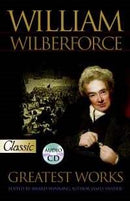Description
Distributor: 316Europe
The 29th Pure Gold Classic, William Wilberforce presents the very best of this great man’s life and work. It includes his Practical View of Christianity,
historic papers, and a wonderful biography of the man who became the conscience of the world and helped bring an end to the practice of slavery in the civilized world.
William Wilberforce, the son of a wealthy merchant, was born in Hull in 1759.William’s father died when he was young, and for a time William was brought up by an uncle and aunt. William came under the influence of his aunt, who was a strong supporter of John Wesley and the Methodist movement. Disturbed by these developments, Mrs. Wilberforce brought her son back to the family home.
In 1784 Wilberforce converted to Evangelical Christianity. He joined the Clapham Set, a group of evangelical members of the Anglican Church, centered around John Venn, rector of Clapham Church in London. As a result of this conversion, Wilberforce became interested in social reform and was eventually approached by Lady Middleton and was asked to use his power as an MP to bring an end to the slave trade.
As a member of the evangelical movement, Wilberforce was sympathetic to Mrs. Middleton’s request. In his letter of reply, Wilberforce wrote: “I feel the great importance of the subject and I think myself unequal to the task allotted to me.” Despite these doubts, Wilberforce agreed to Mrs. Middleton’s request, but soon afterwards, he became very ill and it was not until 12th May, 1789, that he made his first speech against the slave trade.
The 29th Pure Gold Classic, William Wilberforce presents the very best of this great man’s life and work. It includes his Practical View of Christianity,
historic papers, and a wonderful biography of the man who became the conscience of the world and helped bring an end to the practice of slavery in the civilized world.
William Wilberforce, the son of a wealthy merchant, was born in Hull in 1759.William’s father died when he was young, and for a time William was brought up by an uncle and aunt. William came under the influence of his aunt, who was a strong supporter of John Wesley and the Methodist movement. Disturbed by these developments, Mrs. Wilberforce brought her son back to the family home.
In 1784 Wilberforce converted to Evangelical Christianity. He joined the Clapham Set, a group of evangelical members of the Anglican Church, centered around John Venn, rector of Clapham Church in London. As a result of this conversion, Wilberforce became interested in social reform and was eventually approached by Lady Middleton and was asked to use his power as an MP to bring an end to the slave trade.
As a member of the evangelical movement, Wilberforce was sympathetic to Mrs. Middleton’s request. In his letter of reply, Wilberforce wrote: “I feel the great importance of the subject and I think myself unequal to the task allotted to me.” Despite these doubts, Wilberforce agreed to Mrs. Middleton’s request, but soon afterwards, he became very ill and it was not until 12th May, 1789, that he made his first speech against the slave trade.
Paiement et sécurité
Vos informations de paiement sont traitées de manière sécurisée. Nous ne stockons pas les détails de votre carte de crédit et n'avons pas accès à vos informations de carte de crédit.


